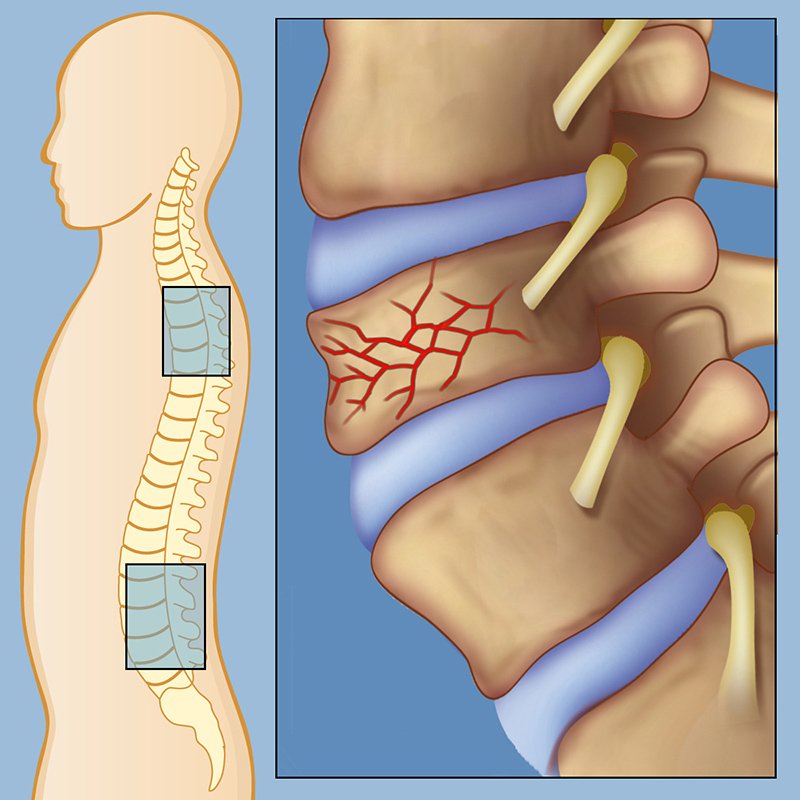Lajpat Nagar Metro Station, Block M, New Delhi, 110024
|096506 82102

Spine Fracture : An Overview
A spine fracture is a traumatic injury to the vertebral bones, often
resulting in severe
pain and
discomfort. It requires immediate medical attention and may involve treatments such as
immobilization,
surgery, or rehabilitation.
Regardless of the severity of the fracture, treatment aims to stabilize
the spine,
relieve pain, and
promote healing. Surgical intervention may be necessary in some cases to realign the
fractured bones and
restore spinal stability.
When Do You Need Treatment for a Spine Fracture?
Our primary treatment modalities include pain medication and physiotherapy following the diagnosis of your condition. Our spine specialists may recommend additional treatments if these initial approaches fail to deliver the desired outcomes. Early intervention is recommended for the following symptoms:
- 1. Foot drop or leg weakness
- 2. Bowel or bladder dysfunction
- 3. Advancing numbness
- 4. Debilitating pain hampering routine activities
- 5.Progressive and recurrent pain after partial improvement
- 6.Lack of improvement or progression of symptoms despite conservative therapy.
→Pre-Surgical Care For Spine Fracture
→ What to Expect During Treatment for Spine
Fracture
→ Guidelines For Post-Treatment Care of
Spine Fracture
Although it is a minimally invasive procedure, treatment for a spine fracture requires adequate pre-operative measures to ensure your safety and the procedure's success.
- Consult your doctor for an overall health and fitness checkup prior to your treatment appointment.
- Inform your doctor of the medications you are following. Your doctor may advise you to refrain from taking certain medications before the treatment.
- Your specialist at shall review your condition and discuss the details of treatment, including physiotherapy, medications, and other procedures.
- Follow any dietary restrictions advised by your doctor.
- You may receive general anesthesia or sedation depending on the nature of the treatment.
- The duration of the treatment may vary depending on the severity of the fracture and the chosen approach.
- After the treatment, your doctor will monitor your recovery and manage any post-treatment pain or discomfort.
- You may need to stay in the hospital for observation and initial recovery.
- Physical therapy may be recommended to aid in your recovery process.
- Your post-treatment recovery and care plan will depend on the specific details of your treatment and your individual progress.
- Follow any instructions provided by your doctor regarding wound care, medication, and activity restrictions.
- Attend follow-up appointments as scheduled to monitor your healing progress.
- Inform your doctor of any concerns or changes in symptoms during your recovery period.
- Make necessary adjustments at home to ensure a safe and comfortable recovery environment.
- Arrange for assistance from family or friends if needed during your initial recovery period.
Understanding Spine Fracture
Spine fractures
carry various risks, including:
- Neurological damage
- Chronic pain
- Restricted mobility
- Spinal cord compression
- Instability of the spine
Spine fractures are diagnosed through:
- Medical history and physical examination
- Imaging tests such as X-rays, CT scans, and MRI scans
- Neurological evaluation
- Bone scans
Treatment options
for spine fracture may include:
- Conservative treatments such as rest, pain medication, and physical therapy
- Bracing or casting
- Surgical interventions such as spinal fusion, kyphoplasty, or vertebroplasty
